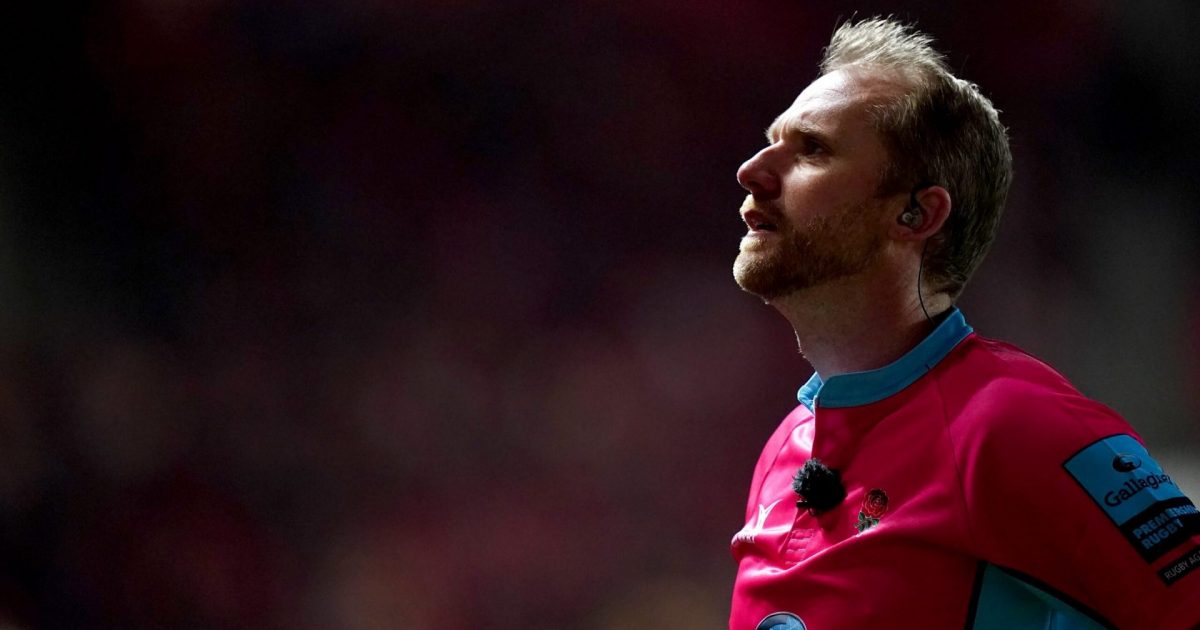Questioning a practicing barrister on precise use of language is not the smartest option for the defence to choose.
And when the barrister in question is also someone who has refereed 98 international rugby matches ‘not the smartest’ quickly morphs into entirely pointless.
Stade Francais’s captain made a token effort to defend his hooker Tolu Latu after he twice swore at Wayne Barnes, but by the time his suggestion that the veteran English official might have misheard some French was in the public domain Stade’s no.2 was already in receipt of a red card and kicking his heels on the sideline.
Explaining his actions Barnes said: “He’s said ****ing hell”. “He’s then looked at me and said, I got the ****ing ball.”
Latu had already received a yellow card for a dangerous clear-out which on another day might have been deemed worthy of red, so minding his p’s and q’s ought to have been foremost in his mind.
However, being on the wrong side of a borderline breakdown call when he was adjudged not to be supporting his weight was clearly too much for the 28-year-old Aussie international.
Wayne Barnes explaining his actions against Tolu Latu.
“He’s said f*cking hell”. “He’s then looked at me and said, I got the f*cking ball.”
?? #SFPvCON#HeinekenChampionsCup pic.twitter.com/sZ6OzMlh1Z
— Darren (@SaffasRugby) January 23, 2022
Given the nature of rugby union, colourful language is never far away but – unless you’re the commentator needing to satisfy Ofcom by continually apologising for the output of the ref mike – providing it has context no-one is too concerned.
A long-time refereeing friend once told me a perhaps apocryphal tale of an incident in a game back in the 1980’s.
The home side’s no.8 – a renowned ‘character’ had repeatedly found himself on the receiving end of the referee’s whistle and in the days before yellow cards was receiving yet another stern lecture in the company of his captain.
When the referee finished speaking the player looked up and asked: “Would you send me off if I told you you’re f***ing crap.”
Slightly startled my friend replied: “Yes I would.”
The player thought for a second and asked: “What would you do if I thought it?”
“Obviously I can’t stop you thinking whatever you want,” the official replied.
“In that case I think you’re f***ing crap,” came the speedy retort!
Knowing where to draw the line is a very difficult question for any referee, but when the bad language is directed pointedly at the official and delivered in a confrontational manner it has to be dealt with.
Sometimes a talking to and – in modern parlance – a request to “come back to rugby’s values” is enough, but depending on what has gone on in the game previously a card may be the only answer.
For instance, when sending Dylan Hartley off in the Premiership final, Barnes had already warned the front rows that he would tolerate no more bad language and dissent, so was really left with no option but to brandish the red card that cost England’s future captain a Lions tour.
But to what extent should the referee intervene to curtail the use of bad language which is not directed at him/her?
In front of a full house at the Aviva Stadium or the Stade de France no-one will hear what is going on let alone be offended by it. But how about a local game being played with almost no spectators?
Early this century having refereed a Warwickshire U18 Cup semi-final I was accosted by an angry mother while leaving the field.
“Why didn’t you do something about the disgusting lineout calls?” she asked.
I had to confess to having no idea what she was referring to since I had paid no attention whatsoever to what was being called.
She went on to tell me her son’s opponents had used language to which she took real offence and refused to believe that this had entirely passed me by. To this day I’m not sure if I would have intervened had I heard it.
Two players swearing at each other is probably preferable to fighting and usually a few seconds to calm down and a quiet word is all it takes to restore some decorum.
One of rugby’s best and most unique features is the responsibility handed to the captain to not only manage his team’s behaviour but also work alongside the referee in dealing with this sort of situation.
My favourite example of this came very early in my career when as a total novice recent ex-player I was in charge of two Midlands-based third XV’s playing in a local park.
While the conversion was lined up after the home side scored a try, I heard a heated exchange regarding who was to blame for the try that involved plenty of swearing taking place behind the away side’s posts.
I was on halfway writing the score in my notebook and waiting for the kick-off when the away team’s captain tapped on my shoulder and pointed back towards the posts where two of his players were behind the dead ball line looking glum.
“Excuse me sir, I just wanted to let you know that I won’t tolerate that sort of language in my team so I have sent them both off,” he advised. “We’ll be playing with 13.”
I was far from sure what happened next, so nodded and we got on with the game.
Half-time arrived around 15 minutes later and the captain jogged over again.
“I think they’ve learned their lesson now ref,” he said. “I’ll send them over to apologise then perhaps you’ll allow them back on the pitch?”
One for Stade’s skipper to take note of perhaps?

















